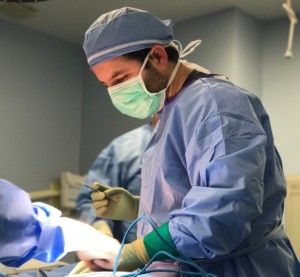
Dr. Antonio Santillan-Gomez is a leading gynecologic cancer surgeon, recently named a 2016 Best Doctor® in the San Antonio area, with extensive experience using the da Vinci robotic surgery technology.
Gynecologic cancers include a variety of cancers in the female reproductive organs. The following are the areas and the types of cancer surgeries Dr. Antonio Santillan-Gomez performs.
Biopsy for endometrial cancer - The GYN surgeon will perform a biopsy to test the uterine tissue for cancer. This is done by dilation and curettage (D&C) with or without a hysteroscopy.
A hysterectomy is often the recommended procedure for uterine cancer. When a woman is still in her childbearing years, Dr. Antonio Santillan will discuss whether it’s possible to perform a fertility-sparing uterine cancer surgery. There are several types of hysterectomy which the surgeon will evaluate and discuss with the patient to choose the option that is likely to produce optimal results.
Robotic laparoscopic hysterectomy / Bilateral salpingo-oophorectomy (BSO) - removal of the uterus with the fallopian tube and ovary. This may also be done with removal of nearby lymph nodes (lymphadenectomy) if needed, and sentinel lymph node removal.
Hysterectomy - using daVinci robotic technology for a minimally invasive surgery, removal of the uterus and/or ovaries.
Cytoreductive Surgery (Debulking) - This procedures is important when the ovarian cancer has spread throughout the abdomen at the time of surgery. The aim of debulking surgery is to remove all cancerous tumors that are larger than 1 cm. This is called optimally debulked. Patients whose tumors have been optimally debulked, have a better outlook than those left with larger tumors after surgery. When possible this is done using minimally invasive surgery techniques such as daVinci.

Clinical examination and biopsies are performed to determine the amount and stage of cancer.
Hyperthermic Intraperitoneal Chemotherapy (HIPEC) for Gastrointestinal cancers
Radical vulvectomy
Carbon dioxide (CO2) laser ablation of vaginal dysplasia - removal of abnormal cells in the vaginal area.
Gestational trophoblastic disease
Gynecological sarcomas
Complex non-cancer gynecologic conditions
Robotic cancer staging
Robotic laparoscopic pelvic SLN